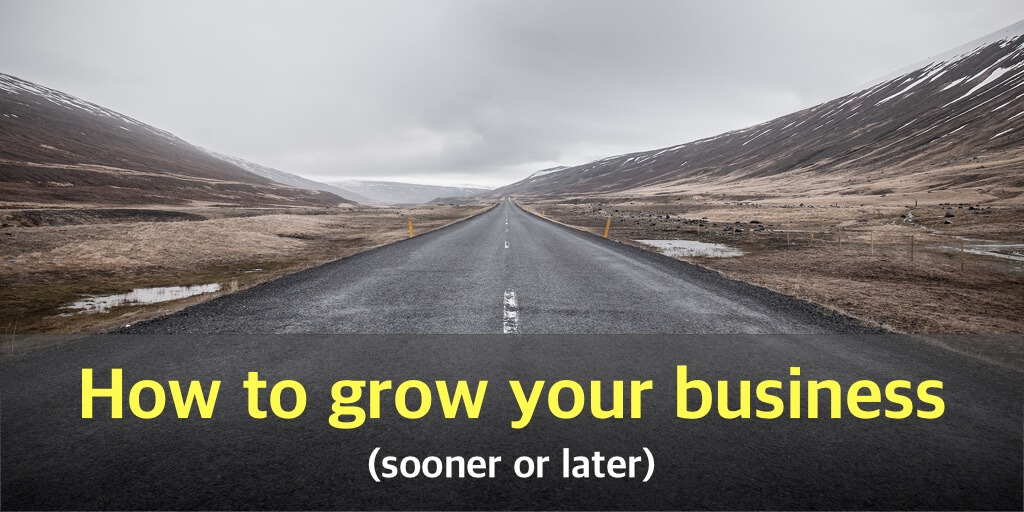How to grow your business (sooner or later)
Almost everybody wants their business to grow; and if you want your business to grow you are likely working hard. For some companies that success comes right away; first some good clients, then some more, then… For others it comes more slowly—sometimes excruciatingly slowly.
This can be a huge challenge. We live in an “instant” world. If something isn’t growing immediately—if we can’t see how it’s “blowing up”— then maybe we should just move on.

Even if your business is growing (and especially if it’s growing more slowly) you are likely full of questions. What do I do? Do I give up? Do I just keep going? Is there something I need to do differently? Was I crazy to have started this business? What am I doing wrong?
If you find yourself in a business like that, you know that those questions go on forever; and there’s no real answer to them. Instead here’s some better questions to ask:
1. Is it sustainable?
For many entrepreneurs there’s no doubt they are working hard—they are running in the red all the time. Late nights, weekends—if there’s not something else scheduled, they’re working. When you are in start up mode you need that. There’s too much to be done and there’s no one else to do it. But it’s not sustainable. For short bursts, sure, we’ve all done it. But if you’re 2 years in and your business still depends on you working into the wee hours on a regular basis, that’s a warning sign. You’re headed for burnout.
But too much work isn’t the only cause of burnout.
Where’s your passion? Is this still fun for you, is all this work rewarding (even when you aren’t getting famous)? If you are getting emptier instead of more full, you are headed for burnout.
2. Are you trying new things?
A client and I finished an interview with a prospective employee and she said, “This candidate didn’t have 10 years of experience, she had one year of experience that she repeated 10 years in a row.” Does that sound familiar?
How can you make next year different from last year? Your outcome is not likely to be different by just “trying harder” and making incremental improvements.
If you are not seeing growth, ask yourself: “Where I can experiment?”. Where can you challenge yourself and your team? Is there a new market, territory, or service offering you need to try out? Do you need to raise your prices? Are you talking to the wrong prospects? What can you try to get a different result?
These should be experiments, not bet the farm risks. Make small, inexpensive tests, then if something works give it more juice and see if it will take off.
“Successful startups are the ones who have enough money left over to try their second idea.” ~ Clayton Christensen, Author and Harvard Professor
3. Do you have a plan?
If you are taking risks and trying new things, how do you know what’s working? How are you seeing and hearing the results of all of the experiments you are running? What are you measuring and how is it getting reported so you can see if it’s working?
I’m a big fan of using an annual budget (“You. Don’t. Say”.) as a way to measure your company’s progress. But for your experiments you need to think about what the early indicators are; what are you looking for that tells you it’s working? Also, think about how to know it’s not working, and when it’s time to move on and try a different experiment.
4. Is someone giving you feedback (from outside your organization)?
Do you know that the “10,000 hour rule” is wrong? Doing something for 10,000 hours (or even 100,000 hours) doesn’t make you an expert. Spending time in deliberate practice, with prompt, consistent feedback, makes you an expert (in about 10,000 hours). It’s not the time that makes you an expert, it’s the feedback. The feedback is what helps you to learn.
Do you have someone you trust — who’s not inside your organization, whose fate is not tied to it’s success — who is giving you regular, prompt feedback about your company’s performance (and your performance as it’s leader)? What if you did? What would you learn?
If this is something you’d like to find out more about, let me know! We’ll see what we can do about that.
Kevin Hart is a talented comedian, actor and entertainer. But if you ask him, talent is not what created his success.
Everybody wants to be famous, but nobody wants to do the work. I live by that. You grind hard so you can play hard. At the end of the day, you put all the work in, and eventually it’ll pay off. It could be in a year, it could be in 30 years. Eventually, your hard work will pay off. ~ Kevin Hart
I think the second half of that quote is more important than the first. “It could be in a year, it could be in 30 years. Eventually, your hard work will pay off.” Sometimes we need to do something to jumpstart any kind of growth, or to speed up growth. But when it comes down to it, Kevin Hart is right; you just have to “do the work”. And sometimes there is nothing you can do but the work itself to speed up the process. Do you want to run the race to the end? Are you driven by a passion for what you do and not where you think it will lead you? Do you have what it takes to keep going even when the growth is slow?
